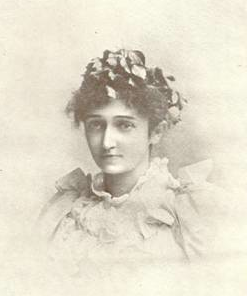‘I have found another way… ‘So wrote fantasy novelist Edith Allonby (1875 – 1905) in a note  found on her lap following her suicide, aged just thirty, in December 1905. When discovered she was sitting in a comfortable chair dressed in a silk evening gown with fresh flowers in her hair. By her side was an empty bottle of phenol (carbolic acid), the poison of choice (bleach was another) for many suicides in the UK at that time, due to its availability and quick, but painful, action.
found on her lap following her suicide, aged just thirty, in December 1905. When discovered she was sitting in a comfortable chair dressed in a silk evening gown with fresh flowers in her hair. By her side was an empty bottle of phenol (carbolic acid), the poison of choice (bleach was another) for many suicides in the UK at that time, due to its availability and quick, but painful, action.
For Allonby, a schoolmistress from Cartmel, Lancashire whose two previous works of ‘ satirical fantasy ‘, Jewel Sowers (1903) and Marigold
(1905), both set on the imaginary planet of Lucifram, had not sold well, there seemed little choice. In her suicide note she explained that after four years of labour on her latest book , a spiritual fantasy about life and death that she claimed had been given to her by God, her publisher Greening had rejected the manuscript, as had other publishers. ‘I have tried in vain ‘, she wrote,’ …yet shall The Fulfilment reach the people to whom I appeal, for I have found another way…’
That way was an act that would make her posthumous book a sensation at the time, for Greening did change their minds about its publication once the author was dead. It came out in a limited edition, which makes it and her previous two novels, scarce and valuable items today. It is possible that originally all the publishers to whom it was shown simply found the subject matter of The Fulfilmenttoo difficult to deal with. The author herself admitted that her book contained ‘either truth or page upon page of blasphemy ‘. Today, we are more open minded on spiritual matters. [R.M.Healey]


Echoes of Confederacy of Dunces. Although it did not come out untill 10 rears aftrer Keenedy Toole’s suicide it seems to have had a greater posthumous success than ‘The Fulfilment.” I wonder if there are other examples…
Hi,
Where did you find the description of how she was found?
Best regards,
Theo
I discovered a lot about Edith online, including an account of her death, which, I believe came from a local newspaper.